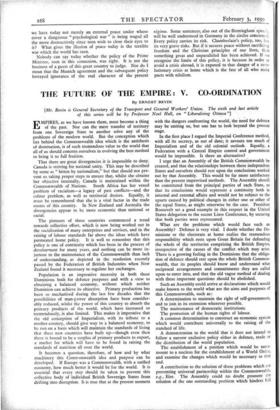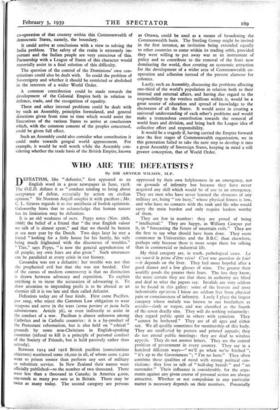THE FUTURE OF THE EMPIRE : V. CO-ORDINATION
By ERNEST BENIN
[Mr. Bevin is General Secretary of the Transport and General Workers' Union. The sixth and last article of this series will be by Professor Noel Hall, on " Liberalising Ottawa "] EMPIRES, as we have known them, must become a thing of the past. Nor can the mere transfer of territory from one Sovereign State to another solve any of the problems of the modern world. But the conception which lies behind the Commonwealth idea which is the antithesis of domination, is of such tremendous value to the world that all of us should concern ourselves in evolving the best method to bring it to full fruition.
That there are great divergencies it is impossible to deny. Canada is striving for national unity. This may be described by some as " bitten by nationalism," but that should not pre- vent us taking proper steps to ensure that, whilst she obtains her objective internally, Canada is maintained within the Commonwealth of Nations. South Africa has her vexed problem of racialism—a legacy of past conflicts—and the colour problem, as well as territorial desires. Equally, it must be remembered that she is a vital factor in the trade routes of this country. In New Zealand and Australia the divergencies appear to be more economic than national or racial.
The pioneers of those countries commenced a trend towards collective effort, which is now being worked out in the socialisation of many enterprises and services, and in the raising of labour standards far above the ideas which have permeated home policy. It is well to remember that this policy is one of continuity which has been in the process of development for many years, and nothing can be more in- jurious to the maintenance of the Commonwealth than lack of understanding, as depicted in the resolution recently passed by the Federation of British Industries when New Zealand found it necessary to regulate her exchanges.
Population is an imperative necessity in both these Dominions both for defence purposes and with a view to obtaining a balanced economy, without which neither Dominion can achieve its objective. Primary production has been so mechanised during the last few decades that the possibilities of man-power absorption have been consider- ably reduced, whilst the power of this country to absorb the primary products of the world, which have increased so tremendously, is also limited. This makes it imperative that the old conception of Imperialism, with its tribute to a mother-country, should give way to a balanced economy, to be run on a basis which will maintain the standards of living that these new countries have built up—though even then there is bound to be a surplus of primary products to export, a market for which will have to be found in raising the standards of nutrition all over the world.
It becomes a question, therefore, of how and by what machinery this Commonwealth idea and purpose can be developed. If Europe was a Commonwealth, with a unified economy, how much better it would be for the world. It is essential that every step should be taken to prevent this collective body of individual British Sovereign States from drifting into disruption. It is true that at the present moment with the dangers confronting the world, the need for defence may be uniting us, but one has to look beyond the present stage.
In the first place I regard the Imperial Conference method, with all its secrecy, as out of date; it savours too much of Imperialism and of the old colonial outlook. Equally, a Federation with a Central Empire control and government would be impossible. Is there an alternative?
I urge that an Assembly of the British Comnionwealth be created, and that the relationships between these independent States and ourselves should rest upon the conclusions worked out by that Assembly. This would be far more satisfactory than the present improvised methods. The Assembly should be constituted from the principal parties of each State, so that its conclusions would represent a continuity both in internal and external affairs and would not be subject to the upsets caused by political changes in either one or other of the equal States, as might otherwise be the case. President Roosevelt set a good example in this respect in the United States delegation to the recent Lima Conference, by securing that both parties were represented.
What are the problems which would face such an Assembly? Defence is very vital. I doubt whether the Do- minions or the electorate at home realise the tremendous responsibility which rests upon Great Britain for defending the whole of the territories comprising the British Empire, irrespective of the causes of the conflict which may arise. There is a growing feeling in the Dominions that the obliga- tion of defence should rest upon the whole British Common- wealth, that its peoples should know and understand what reciprocal arrangements and commitments they are called upon to enter into, and that the old vague method of dealing with these important questions should be abolished.
Such an Assembly could arrive at declarations which would make known to the world what are the aims and purposes of this Commonwealth, such as: A determination to maintain the right of self-government, and to join in its extension wherever possible.
The maintenance of democratic institutions.
The promotion of the human rights of labour.
A common determination to construct an economic system which would contribute universally to the raising of the standard of life.
A demonstration to the world that it does not intend to follow a narrow exclusive policy either in defence, trade or the distribution of the world population.
The establishment of a position which would be tanta- mount to a nucleus for the establishment of a World Order, and examine the changes which would be necessary to that end.
A contribution to the solution of those problems which are preventing universal partnership within the Commonwealth, e.g., Eire. The Assembly could no doubt promote the solution of the one outstanding problem which hinders full co-operation of that country within this Commonwealth of democratic States, namely, the boundary.
It could arrive at conclusions with a view to solving the India problem. The safety of the realm is extremely im- portant and the Indian people are very conscious of this. Partnership with a League of States of this character would materially assist in a final solution of this difficulty.
The question of the control of the Dominions' own con- stitutions could also be dealt with. So could the problem of Sovereignty and whether it should be restricted or abolished in the interests of a wider World Order.
A common contribution could be made towards the development of the Colonial Empire both in relation to defence, trade, and the recognition of equality.
These and other internal problems could be dealt with by such an Assembly, principles formulated, and general directions given from time to time which would assist the Executives of the various States to arrive at conclusions which, with the common consent of the peoples concerned, could be given full effect.
Such an Assembly could also consider what contribution it could make towards general world appeasement. For example, it would be well worth while the Assembly con- sidering whether the trade basis of the British Empire, known as Ottawa, could be used as a means of broadening the Commonwealth basis. The Sterling Group might be invited in the first instance, an invitation being extended equally to other countries to come within its trading orbit, provided they were willing to put away war as an instrument of policy and so contribute to the removal of the fears now dominating the world, thus creating an economic attraction for the development of a wider area of Commonwealth co- operation and adhesion instead of the present clamour for colonies.
Lastly, such an Assembly, discussing the problems affecting one-third of the world's population in relation both to their internal and external affairs, and having due regard to the responsibility to the voteless millions within it, would be a great source of education and spread of knowledge to the electorates of all the States. It would assist in creating a universal understanding of each other's problems and would make a tremendous contribution towards the removal of world fears and division, and bring back the League idea of collective effort and responsibility.
It would be a tragedy if, having carried the Empire forward into the first stages of Commonwealth organisation, we in this generation failed to take the next step to develop it into a great Assembly of Sovereign States, keeping in mind a still greater conception, that of World Order.











































 Previous page
Previous page